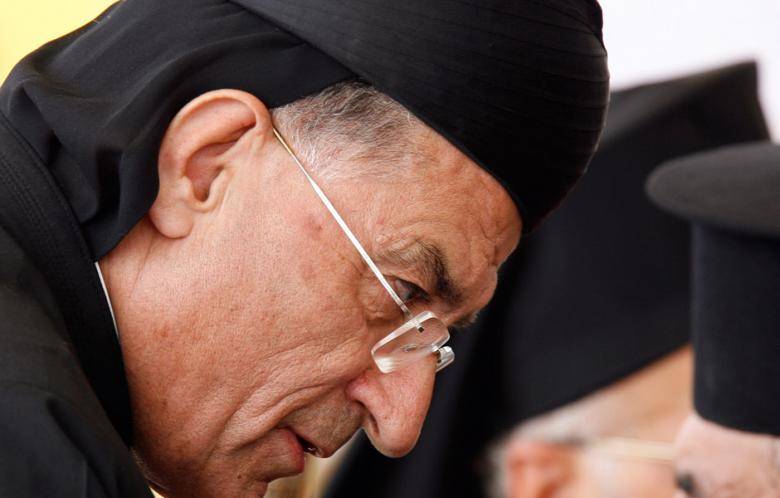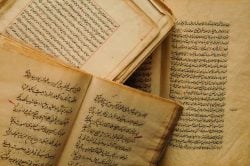The Politics of Maronite Patriarch Rai’s Planned Visit to Jerusalem
Since news of the Maronite Patriarch’s planned visit to Jerusalem broke earlier this month, the topic has quickly transformed from being completely unimaginable to becoming a backdrop on which to project every political reading imaginable. With so little information and explanation coming from the Patriarchy itself, most of this debate’s been fueled by speculation.
A major part of the disagreement seems to stem from a fundamental difference of opinion about what comes first: political or religious identity. From the very beginning, Patriarch el-Rai has insisted that his trip is not “a political visit, but a religious one.” Lebanese blogger Elie Fares seems to agree, questioning whether the Patriarch’s Lebanese identity – and hence, by implication, the ban on travel to Israel that applies to all Lebanese citizens – supersedes his religious identity as head of all Maronite churches everywhere. Blogger Gino Raidy takes this line of argument a step further, insisting on his blog that the law – and hence, el-Rai’s civic identity – can only be prioritized if all religious leaders do the same, including Muslims leaders who have opposed civil reforms that contradict their interpretations of religious doctrine.

(Photo via Al-Akhbar)
While both posts are a bit too narrowly Lebanese in focus, what is most interesting about this line of argument is that even when the religious dimension of the visit is being emphasized, a largely political argument about rights, duties and equal treatment still slips through, making the initial distinction between religion and politics extremely difficult to maintain. Hence, Fares ends his post by arguing that the Patriarch’s visit would “probably do more to the Palestinian cause than months of Starbucks boycotts,” a position, which, if we are to keep assuming that the Patriarch’s political and religious identities can be neatly separated, would be a total non sequitur.
The fact that religion and politics cannot be neatly separated is what is highlighted in a statement by Kairos, a Christian Palestinian activist group who urged Rai to reconsider, arguing that the visit “may delight the occupation state [of Israel], not because it believes in the right of religions to express themselves and to practice their rituals, but because it serves its policies and whitewashes its face.” This sentiment is echoed by the Campaign to Boycott Supporters of Israel in Lebanon who wrote an open letter urging Patriarch el-Rai to “be loyal to the struggle of the Palestinian people who are crucified, like Christ, every day but who rise again every day and resist their enemy and boycott it.” Hence, both statements have attempted to reframe the Patriarch’s duty to his Church within the wider ethico-political context of the Arab-Israeli conflict, bridging the religious with the political.
Other criticisms, however, have been much harsher, with some in Lebanon calling the planned visit a “historic sin” and a “political coup.” These interpretations read the situation from a much more narrowly partisan perspective. Some have wondered what this plan means vis-a-vis the Maronite Church’s relationship with Hezbollah, for example. Political commentator Nahed Hatter went as far as linking the visit to what he called “the patriarchal inclination towards extending the term of a [Lebanese] president who is hostile towards the Resistance and who courts the killers of Syria’s Christians.” This particular reading misses that the fact that el-Rai himself has repeatedly voiced a strong position on Syria, thereby alienating the very faction that is most openly opposed to the Syrian regime (See this report for more on how the Syrian crisis has divided the Maronite community).
The very fact that el-Rai’s political positions since being appointed Patriarch have been hard to pin down within the standard map of Maronite and/or Christian partisanships, makes reading the planned visit from a narrow perspective even more difficult. Bechara el-Rai, as Marina Chamma reminds us, was best known as the hardliner in the Maronite Council of Bishops. In 2009, the council announced that any Maronite who attacked the Patriarchy would be excommunicated (a statement that many read politically at the time). It is in this way that Rai has been seen as both pro- and anti- different Christian parties at different times, causing some to scramble to explain his apparent fluctuations. Perhaps, then, it is less useful to try to analyze his positions within this map, than to see his maneuvering as an attempt at drawing a new one in which the Maronite Patriarch is autonomous from the mainstream politics of Maronite leaders. Could this be what he meant when he called for a “Christian Spring”?
Patriarch el-Rai has since responded to his harshest critics by calling their campaign against his visit to Jerusalem “shameful,” adding that he is “sorry to see that some Lebanese want to create problems where none exist.” El-Rai insisted that his visit would in itself be a declaration of the Arab and religious identity of the city of Jerusalem, and hence cannot be seen as a form of ‘normalisation’ with the Israeli state. And yet, it is not yet clear what he will actually declare while there. Will his non-normalisation be simply implied, or would the visit be used as an opportunity to show real solidarity with the Palestinians from inside the occupied territory, as some have suggested? The Patriarch so far has not made any concrete statements in this regard, and so we are only left to speculate. We are not even sure how he will cross the border, with some claiming that he will fly from Cyprus, and others saying that he will be bused in from Amman.
In fact, it seems as though the Church’s main PR strategy so far has been to end the discussion in any way possible, even if this comes at the cost of clarity. So, for example, some Church leaders have argued that it is “unthinkable” for the Patriarch to “refuse a papal invitation,” and yet, el-Rai’s predecessor, the Patriarch Emeritus Nasrallah Boutrous Sfeir, did just that when Pope John Paul II visited. Furthermore, we’ve since learned that the trip itself was the Patriarch’s own initiative, and hence, not a papal invitation at all. Bishop Samir Mazloum explained this apparent discrepancy by arguing matter-of-factly that the Patriarch will visit on his own initiative because he “is the owner of the land, [and] he is in charge of the area.” This extremely narrow and legalistic approach to the subject does little to alleviate the critics’ worries. So, while the Patriarch’s “clerical duty” may be “normal” from the perspective of the Church, it is still quite abnormal given the bare facts of history, as Chamma has also argued. The Church’s reluctance to discuss more openly and proactively the details and implications of the visit seems tone deaf, to say the least.
It is this offhanded manner with which the Patriarch has dealt with the whole issue that is most perplexing. Can the very first visit of a Maronite Patriarch to the Holy Lands since the Nakba really be approached so casually, as though nothing at all of consequence has happened since 1948 in Palestine and Lebanon?
And let us not forget the biggest elephant in the room: the Maronite Church’s relationship with the State of Israel has not been innocent, as research into the secret treaty of 1946 has shown. That relationship was a case of a purely ‘religious perspective’ having very dark political consequences. If the Patriarch is indeed attempting to redraw the political map in a kind of “Christian Spring,” then we should expect him to also have the courage to confront this uncomfortable chapter in our history. Only then would the single-mindedness driving this planned visit make any sense or be worthwhile.





